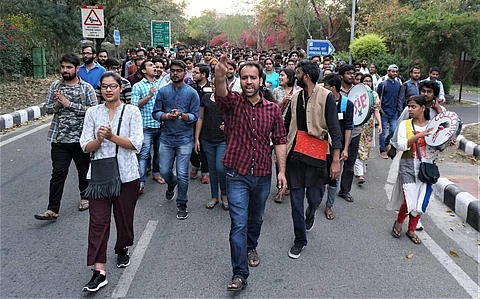JNU students call off hunger strike, vow to march to parliament as part of anti-Modi poll campaign
After nearly ten days of dehydration, hunger, plummeting blood sugar levels and testing the extent of their mortality, the JNU 11 - eleven students who began a hunger strike on March 18 to get the VC to listen to their list of demands - and the JNU Students' Union have called off the strike. JNUSU President N Sai Balaji made a statement in the presence of a large crowd composed of studnents and JNUTA members outside the Sabarmati Hostel, "We will call off the hunger strike now, on the condition that all the students support us in getting rid of this Mamidala and other Mamidalas in other universities and this government that is enabling them."
But it came with a caveat, of sorts. He said that they intended to launch a stiff anti-BJP campaign ahead of the Lok Sabha pills next month to ensure that the government was voted out of power, "We will stop this hunger fast only if the Modi government is defeated. We will march to Parliament and start a movement to defeat this government," he added. The decision to call off the strike came after a concerted request on the part of the JNUTA's Atul Sood, who read out a declaration - a charter of demands made by the forum of the people of India and the government - ending with a call to end the strike. The decision had been mulled over for two days now, ever since worsening health levels of the eleven students coincided with a stubbornness on the part of the VC to meet with them or pay heed to their demands.
In his reading of the Sabarmati Declaration, as students are now calling it, Sood placed the following points, "Public education must be publicly funded. Academic insititutions are in a state of collapse. We reject all these schemes and policies and at least 1.5 out of 6 pc of the GDP spent on education," he said in reference to the funding and seat cuts that have befallen JNU and other central varsities in the years prior.
He also spoke about the need for a transparent system that was bereft of political involvement and influence, "Public education must be autonomous from the government. Institutional autonomy has been whittled away to the extent where the MHRD interfered in the functioning through heads of institutes. Recruitments and promotions are thought through with political considerations. Transparent appointment of VC's must be implemented so that there is complete accountability is there."
Finally, he also spoke about the need to make campuses free again, constitutionally and in reality, "University spaces are no longer considered as spaces of justice. Laws like sedition, USPA should not be applied to institutions. All unfair penalties must be withdrawn against students and faculty. We pledge to fight against the right wing neo-political politics. We will press forward in the Lok Sabha elections with this vision in mind," read Sood.
Related Article
CBI denies missing JNU student Najeeb's mother access to his call logs, other records
What exactly happened when JNUSU students marched to VC's house?
I have forgiven you, says JNU VC. What on earth for, ask students as hunger strike continues
Meet JNU's Yogiji, who is organising a Main Bhi Chowkidaar-themed cultural night at Sabarmati Hostel


